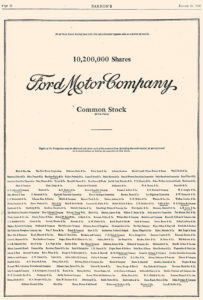Rules on marketing and advertising your equity crowdfunding campaign are more restrictive than you think. Startups accostomed to blogging your every thoughts and feelings beware.
When the SEC adopted the crowdfunding rules under Regulation CF, it included severe restraints on a company’s ability to publicize its crowdfunding campaign. Many people think the SEC allows general solicitation and it applies to everything. Wrong. It does not apply to crowdfunding.
You know those cool tombstone ads in the Wall Street Journal showing off an IPO? That shows the type of information that your crowdfunding notices can include.
A crowdfunding advertising is limited to:
- a statement that the issuer is conducting a crowdfunding offering in reliance on section 4(a)(6) of the Securities Act of 1933
- the name of the platform
- a link directing the investor to the intermediary’s platform;
- the terms of the offering; and
- factual information about the legal identity and business location of the issuer, limited to:
- the name of the issuer of the security
- the address of the issuer
- phone number of the issuer
- website of the issuer
- the e-mail address of a representative of the issuer and
- a brief description of the business of the issuer.
The description of the terms of the offering must be limited to:
- the amount of securities offered;
- the nature of the securities;
- the price of the securities; and
- the closing date of the offering period.
That’s it. Some short bullet-pointy info dots.
There’s no “this is the Internet and I can say whatever I want.” There’s no “This is the new world and old rules don’t apply.”
Is it limiting? Yes.
Is there a reason? Yes.
As with public offerings, there is a required disclosure document, in this case Form C. The SEC wants to make sure you have access to it before you make an investment decision. The SEC does not want a hyped-up ad to entice you to purchase before you have the ability to review 50 to 100 pages of required disclosure.
Any good news? Well, the company does not have to file the notices with the SEC. The company is not limited to newspapers. The notices can go anywhere, such as social media or the company’s website.
Also, the company can communicate with investors through the crowdfunding platform. The SEC believes that this ability will facilitate the wisdom of the “crowd” in crowdfunding. The company must identify itself as the company and not as “Random Guy Who Believes Company Will Be the Next UBER x Google.”

